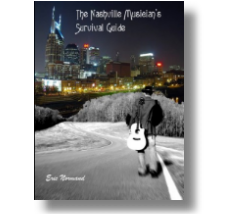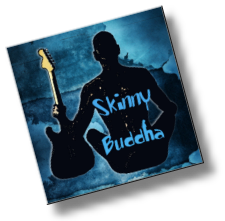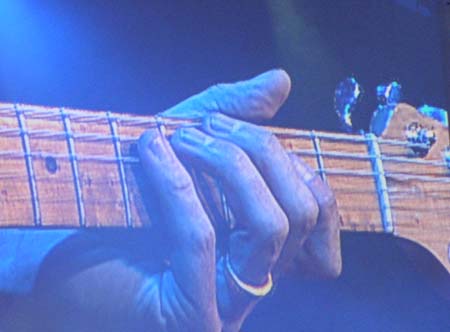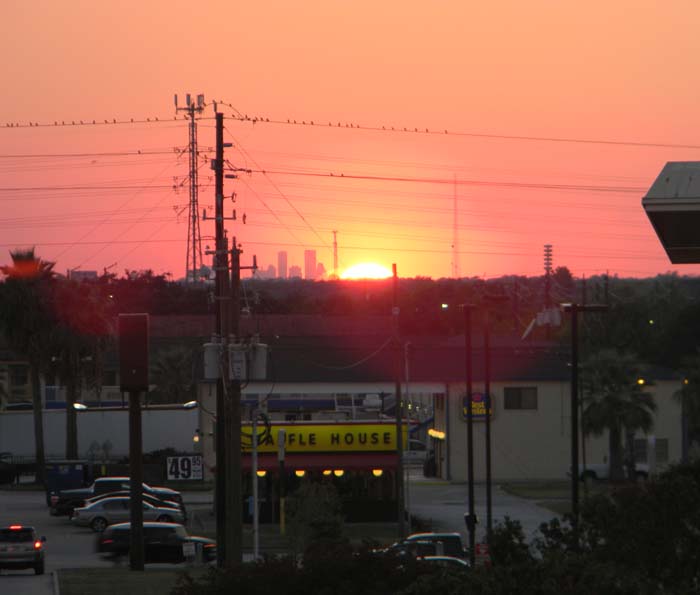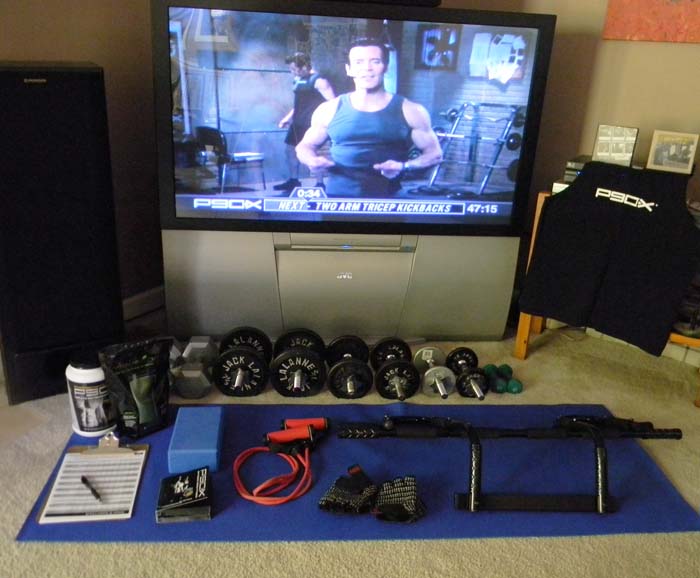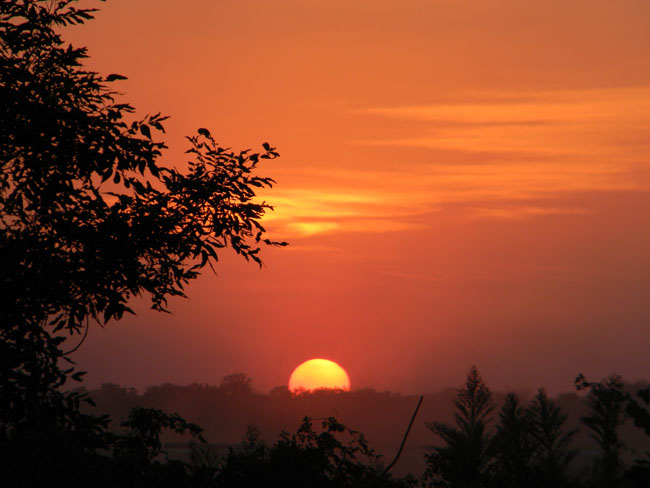
As a professional freelance musician working and living in Nashville, much of the work I perform is for other people’s entities, as is true for many hired guns. I’m not complaining mind you, this is how the bills get paid. My regular gig as tour manager/guitarist for Rhett Akins occupies many weekends throughout the year, and sporadic nightclub gigs and songwriter recording projects help to fill in the gaps. As rewarding as some of this work can be, it all comes under the heading of ‘gun for hire’ which means I must meet somebody else’s expectations, as they are footing the bill, often adjusting my musical tastes and desires to fit the gig.
So whenever it’s feasible, I take on gigs purely for my own musical expression, a little ‘music for the soul’ as I call it. Now that fall is here and the annual touring/festival season is drawing to a close, I’ll have a little more time for these kinds of endeavors. With that, I’m excited to tell you about my new project – Eric Normand and Endless Boogie. The concept of this band is simple. I will play only music that I enjoy playing, with people whom I enjoy playing, in venues that are enjoyable to play.
Growing up in the 70s and 80s I always looked back a few years to find my musical heroes; Jimi Hendrix, the Allman Brothers, ZZ Top, John Lee Hooker, and to this day this is still some of the most expressive music I ever play. So in my new Nashville based ‘fun band’ that’s just what were going to do. The song list will contain Hendrix classics like Little Wing, Voodoo Child, and All along the Watchtower, Allman Brothers classics like You Don’t Love Me, Ain’t Wastin’ Time No More, Melissa, and Whipping Post, classic blues songs like Freddie King’s Going Down, John Lee Hooker’s Hug You, Kiss You, Squeeze You, and even a few of my favorite instrumentals by Miles Davis and The Meters. Needless to say, we will put our own spin on these.
As I live in Nashville, and this kind of song list will not command top pay, getting great players to commit to a gig like this isn’t easy. All the best players are usually pretty busy taking the most lucrative gigs offered, and even if you get them to commit, something always seems to come up. So you either have to have two or three players deep on each instrument that know your material, or you have to wait till the last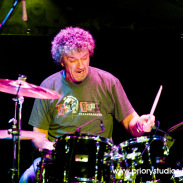 minute to book the players. I got real lucky for this first outing of Endless Boogie as a couple of my good friends, Fran Breen and Mike Chapman, just happened to be available.
minute to book the players. I got real lucky for this first outing of Endless Boogie as a couple of my good friends, Fran Breen and Mike Chapman, just happened to be available.
Fran Breen is a world-class drummer from Ireland that has worked on and off in the Nashville music industry for over 20 years. He’s played with a few major artists like Lucinda Williams, Nancy Griffith, Shelby Lynn, and is also an accomplished session drummer having played on countless projects over the years including the soundtrack for the movie “The Commitments” . He’s a top notch groove machine, especially when it comes to blues and funk, and I’m thrilled to have him on the gig. (Plus he is really funny and has the coolest Irish accent.)
Mike Chapman is one of the best bassists Nashville has to offer, and another ace in the hole who happens to be a good friend of mine. Mike’s first big gig was with Hank Williams Jr. in the early 80s, since which time he has played on innumerable A-list recording sessions ranging from literally all of Garth Brooks recordings to Leanne Rimes, Brooks & Dunn, Huey Lewis and countless 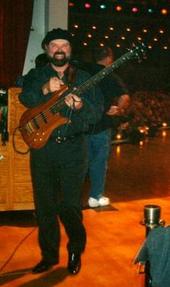 others. Mike has played bass on over 30 number 1 singles and the albums that he has played on have sold over 150 million copies. If it sounds like I’m bragging a little bit about these guys, it’s because I am. I mean how often does one get to say “My drummer played on the Commitments soundtrack” or “My bass player has been heard on 150 million albums”?
others. Mike has played bass on over 30 number 1 singles and the albums that he has played on have sold over 150 million copies. If it sounds like I’m bragging a little bit about these guys, it’s because I am. I mean how often does one get to say “My drummer played on the Commitments soundtrack” or “My bass player has been heard on 150 million albums”?
The last ingredient for my first outing with ‘Endless Boogie’ is a fun venue in which to play. The Fillin’ Station, located on Main Street in Kingston Springs, is the perfect venue for an intimate night of exploratory rockin’ blues and funk jams. While playing on big tours in front of thousands of people can be exciting, sometimes the finer points of the music get lost in the ‘bigness’ of those events. To this day, my favorite musical settings are small to midsize nightclubs, for it is in these small-town bars and juke joints of the world where the magic really happens. The Fillin’ Station is owned by Patrick Weickenand, former member of Eric Burdon’s band ‘War’ and one of the nicest guys you’ll ever meet who also blows a mean harp from behind the bar from time to time. The club is small but comfortable, and has an adjoining outdoor patio which fills up with locals on many a night. The club is just 25 minutes from downtown Nashville (exit 188 off of I40 west) and features live music four to five nights a week year-round, never with a cover.
I’ve been wanting to put together a group like this for a few years now, toying with the idea periodically, but never quite getting organized enough to make it happen. But I’ve realized that this is just what you have to do in Nashville, you have to find a way to not lose sight of your own vision even while you spend most of your time working for other people. My musical dreams at this point of my life are quite simple, I want to play the music that I love to play, the way I want to play it, hopefully taking a few others along for the ride.
So that’s it, all the essential ingredients are in line for an expressive night of music – songs I enjoy playing, people I enjoy playing with, and a place I enjoy playing at. Our show will be this coming Saturday, October 16 from 7:00 to 11:00. I’m really pumped for this show, so if you live in the Nashville area come on down for a night of Endless Boogie!
October 8, 2010 – Dallas, Texas
We left Nashville Thursday at midnight, bound for two shows deep in the heart of oil country, the first being at the oversized dance hall, Cowboys Red River in Dallas, Texas. Our regular bassist, Clint Jacobs, absent on this particular run, I sat in the front lounge chatting with his sub, friend and longtime Nashville veteran, Mike Chapman for a bit before heading to bed. This trip would normally take about 10 to 11 hours, but at about 5 AM I awoke and realized we had been stopped for a little bit. I drifted off for a while and when I got up around 10 I learned that Steve, our bus driver, got stuck in a massive traffic backup for three hours in the middle of the night, the result of an overturned tractor-trailer that had blocked the interstate. Scenarios like this are why we always allow for extra travel time on these trips. Nevertheless, the extra three hour wait added on to the middle of this 700 mile drive had left Steve exhausted, and we finally pulled into Dallas around 1:30.
As we entered the dark Honky Tonk, we noticed that musky stale beer odor inherent to these kinds of places, the kind of deep rooted 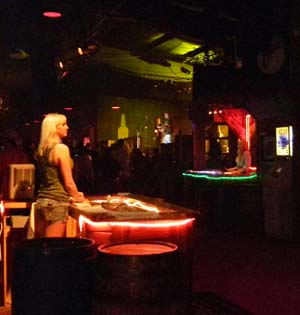 lingering odor that takes decades to create, and while barely noticeable amidst the hustle and bustle of nighttime business, is almost overbearing during the empty daytime hours. While we were setting up, Rhett had the runner take him on a brief tour Dealey Plaza, the infamous location of the assassination of JFK. A little while later he returned with some memorabilia, as apparently a JFK assassination history buff has some kind of ‘merch table‘ at this location. I’m not sure if this is somebody’s desire to inform the masses of this tragic conspiracy, or simply capitalism at its worst. (Maybe it’s a little of both.)
lingering odor that takes decades to create, and while barely noticeable amidst the hustle and bustle of nighttime business, is almost overbearing during the empty daytime hours. While we were setting up, Rhett had the runner take him on a brief tour Dealey Plaza, the infamous location of the assassination of JFK. A little while later he returned with some memorabilia, as apparently a JFK assassination history buff has some kind of ‘merch table‘ at this location. I’m not sure if this is somebody’s desire to inform the masses of this tragic conspiracy, or simply capitalism at its worst. (Maybe it’s a little of both.)
Other than watching a little bit of a fascinating assassination documentary, the rest of this day, and night for that matter, were rather uneventful. I wish I could say that it was an exciting memorable show, like most of our shows, but it wasn’t. The audience just kinda laid there. Don’t get me wrong, the 1500 or so in attendance danced and drank, and even made some noise after some songs, it was just one of those nights that felt like it never quite got there. I later reiterated to Rhett one of the tour’s long standing inside jokes “Out of all the shows we’ve ever done together, that was definitely one of them.”
Onward to Baytown
Baytown is a suburb of Houston, and a city of roughly 80,000 deep in the heart of oil country. We arrived to a hotel parking lot in the wee hours of the morning and taxied the bus over for load in around noon. On the previous day, everything had gone according to plan with no surprises, while this day would turn out to be full of surprises, the first being my discovery of a miscommunication regarding our ‘bus stock’. Our bus stock is a list of beverage and food items which appears on our rider, and is required, in most cases, to be delivered to our bus upon arrival as it serves to be lunch for our crew. I never got the memo that they wouldn’t be providing this and, fortunately, they were gracious enough to send somebody for it at the last-minute.
The next surprise came a couple of minutes later when the event coordinator informed me that they were having problems with the rented generator. It turns out that the generator rental company arrived earlier in the morning to drop off the generator, and then left without showing anybody how to work it. Around the same point in time I was introduced to the house sound technician whose introduction consisted of “Glad to meet you, I hope you brought a lot of patience with you because we’re running way behind.” “Glad to meet you too.” Next would come what was perhaps the biggest hurdle we would have to overcome on this day that was quickly evolving into what I commonly refer to as “a challenge” otherwise known as a good old-fashioned pain in the ass. That being, the stage from hell.
Upon setting foot upon this tin nightmare, I was baffled to see a gaping four-inch wide “space” that ran lengthwise across the 30 foot stage at about 5 foot intervals. “Well that’s a great way to break an ankle if I’ve ever seen one!” I commented to the promoter, who acknowledged “Yeah it is, I didn’t notice that before.” To make matters worse, a round piece of steel pipe protruded upward from this “space” at 6 foot intervals, serving as a strategic array of would-be landmines for everybody to trip over for the day. After some discussion with the promoter, we determined that we needed some rubber mats or plywood to place on top of this unsafe deck. A little while later I discovered a huge role of thick old industrial carpet backstage and, while it initially looked like it might serve our purpose, I quickly discovered that it was full of “fire ants”. I also learned, very quickly mind you, that fire ant’s bite! The bites on my fingers and hand still swollen as I write this.
One of the event coordinators suggested some four by eight sheets of rubber matting and, after I concurred that it might work, he set out for Home Depot. Around this time, I asked Scott, our other guitarist and part-time “Macgyver” if he could try to figure out the generator issue. A little while later a truck arrived with 10 sheets of rubber matting and I began to direct some stagehands to help ‘rubberize’ our stage while Scott dug into the genie. A couple of hours later and the stage was covered with a solid rubber matting (we had to cut holes for the protruding steel pipe with a drill and utility knife), Scott had brought the generator to life, and we began our load in and sound check.
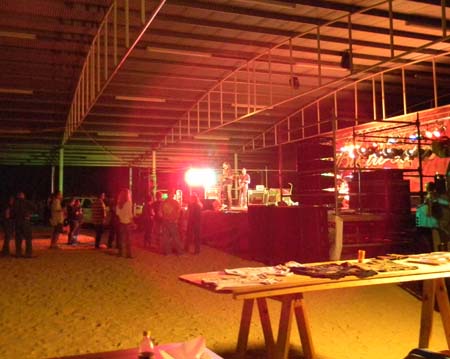 After the sound check, we all feasted on some locally famous barbecue, and went to the hotel for some downtime before the show. I returned to the venue around 7:30 hoping to catch some of up and coming and Nashville based Matt Stillwell’s, set. Unfortunately, because one of the other acts, George Dukas, was running late, their performance times were swapped, and I arrived after their show had already ended. We began our show at 9:30 on the dot, surprisingly right on time considering the chaotic mess of the day we had just encountered. This event was the annual “Helping a Hero Benefit” put on by the Baytown Police Department, and served to help raise money for a fund for families of officers lost in the line of duty. While the attendance was less than desired, the quality of the audience was anything but lacking. A handful of town folk that did show up spent quite a bit of money on some big dollar auction items for this great cause and stayed for the entirety of our 90 minute set. Mike Chapman, who had only played with us on a couple of other occasions, nailed the show to the floor, his 3+ decades working in the Nashville music industry recording with such giants as Garth Brooks, LeeAnn Rimes, and countless others, no doubt aiding in his proficiency.
After the sound check, we all feasted on some locally famous barbecue, and went to the hotel for some downtime before the show. I returned to the venue around 7:30 hoping to catch some of up and coming and Nashville based Matt Stillwell’s, set. Unfortunately, because one of the other acts, George Dukas, was running late, their performance times were swapped, and I arrived after their show had already ended. We began our show at 9:30 on the dot, surprisingly right on time considering the chaotic mess of the day we had just encountered. This event was the annual “Helping a Hero Benefit” put on by the Baytown Police Department, and served to help raise money for a fund for families of officers lost in the line of duty. While the attendance was less than desired, the quality of the audience was anything but lacking. A handful of town folk that did show up spent quite a bit of money on some big dollar auction items for this great cause and stayed for the entirety of our 90 minute set. Mike Chapman, who had only played with us on a couple of other occasions, nailed the show to the floor, his 3+ decades working in the Nashville music industry recording with such giants as Garth Brooks, LeeAnn Rimes, and countless others, no doubt aiding in his proficiency.
This stressful day came together as the result of a lot of teamwork. Scott, with some background in electronics, was apparently the only person on site possessing the knowledge it would take to make that generator come to life and power the show. The Baytown police went and purchased the rubber mats for the stage. Our bus driver, Steve provided some of the tools that were necessary for our rubber stage modifications. Matt Stillwell and band was gracious enough to perform their show two hours ahead of schedule. In hindsight, it’s funny, even kind of ironic, that while the day before had gone so smoothly, and it’s show had felt so sluggish (despite a crowd of almost 2000), that this difficult day, despite its low attendance and being full of problems, delivered a concert experience that was far more rewarding. Put these two wildly different events and shows together and you wind up with one great day and one great show – A fitting end to our 2010 touring season.
Becoming a successful musician or an entertainer in the 21st century is a tough endeavor. It’s probably as difficult as becoming a successful actor in Hollywood. In this field of extreme competitors, you need to have every advantage you possibly can. Even if you aren’t going after the big prize, for many musicians, a lifetime of pursuing their craft will still take its toll. This is why it is in the best interest of most musicians to be physically fit.
If you are a musician, whether you play guitar, drums, sing, saxophone, or other, you inevitably fall into one of two categories; 1.) Professional musicians, semi professional musicians, and musicians aspiring to become professionals, or 2.) Amateur musicians, hobbyists, and musicians that play solely for expression, art, or the fun of it, regardless of compensation.
If you are either working as a professional musician, or aspiring to do so, you probably already know how competitive this field is (if you don’t, you might want to take a look around you). To earn a living as a musician in this day and age, or at least a partial living, a great many things must come into alignment. Talent, social skills, looks, longevity, and luck are some of the essential components. Since you really can’t control luck, and assuming you have some talent and social skills and are already honing those traits, that leaves looks and longevity up for grabs. This is where physical fitness comes into play.
Looking Good
I chose to address this factor first because so much of what happens in the entertainment industry is based on appearances. As superficial as this may be, it is simply a fact, and one that shouldn’t be overlooked. While I do feel that looks and talent shouldn’t have to be tied together, the focus here is on the music business, so I’ll save that discussion for another time.
We have a strange way of approaching how we look in our society, that being that we tend to put makeup on a pig. I’m sure you’ve heard that expression before, but here’s my spin on it. How many times have you seen some performer, whether on TV or in a nightclub, who has obviously put a lot of thought into his or her wardrobe and appearance? $300 haircuts, pre-ripped and pre-faded designer jeans, fancy shirts, eye-catching jewelry, makeup, even an obvious obsession with tanning is evident for some. Yet when you look at the performer’s arms , there isn’t a hint of muscle tone to be found anywhere. Even though they aren’t obviously overweight, you can’t help but notice their ass looks just a little too big for the outfit struggling to hide it. Or perhaps he or she has no ass all, flat as a board on the backside due to the fact that they have no muscles there either. Of course this description would describe many people in almost any field. As most Americans are now overweight, each year the numbers steadily increasing, so is our desire to attempt to mask this fact with fancy haircuts, designer clothes, spray-on tans, and makeup.
But if you are aspiring to be a professional musician, you are different than most people, you are in the world of showbiz. This means that, in many cases, your appearance is directly tied to your career, and sooner or later you will be judged on your looks. So rather than continuing to follow the trend of ‘putting makeup on a pig’ why not address the issue at its core and put more emphasis on physical fitness. There is a difference between being skinny, a little overweight, and being physically fit. I have been skinny for most of my life, but I have not always been fit. When you are physically fit clothes automatically hang better, your skin color looks better, and your face looks younger. People who are physically fit tend to have increased energy and stamina, and this helps to project a more youthful vibe in general. Not to mention the increased confidence and sex appeal that can come with being in great shape. With the music and entertainment industries now more competitive than ever, there is simply no excuse to not look as good as you possibly can. A fancy haircut and designer clothes aren’t going to fool everybody.
Longevity
To me, the need for longevity makes the best case for being physically fit, and this applies to all musicians, pro or otherwise. From the time we were teenagers, through our 20s, even into our 30s, typically, our bodies are still functioning under their original drivetrain warranty, meaning that, at least for most of us, things aren’t yet starting to go wrong on the grand scale that they eventually will. If you are a young person and reading this, you’re probably thinking “That’s the kind of crap my grandfather used to tell me.” Well I hate to say it, but ol’ grandpa was right. As our bodies age our joints begin to wear, we become more susceptible to injuries, injuries take longer to heal, and a whole host of other problems ranging from high blood pressure to heart disease and beyond start becoming more likely. I’ve had tendinitis for five years now, and sometimes it interferes with my playing. Some of my musician friends, after decades of problem free careers, are now starting to have their own problems too. Everything from back problems to carpal tunnel and even diabetes and strokes are now interfering with their careers and lives.
The effects of aging can and will happen to people from all walks of life, but the hard lifestyles of many musicians can further amplify the effects of aging. Being a musician is stressful, often requires extensive travel, and for many of us, requires a repetitive hand, arm, or leg motion that is certain to lead to problems. Being physically fit is the only way to combat these problems. Alcohol or drugs, whether prescribed or other, are only a band-aid, and for many, masking the pain in this way can lead to further injury. Being a career musician, I often have little to no choice about the gigs I need to take to make a living. Sometimes I will play a 3 1/2 hour show nonstop. This requires great stamina and, even though I am in good shape, sometimes my whole body aches after a long hard gig. How much worse would I hurt if I didn’t take care of myself? I still have to load my gear into my car regularly and my Vox amp weighs almost 100 pounds. Over the years, I’ve thrown out my back doing this on more than one occasion, being physically fit helps combat this as well. Regular exercise has been the best weapon against my tendinitis too. Without regular stretching and exercise it quickly becomes almost unbearable.
In the world in which we live and work, a world full of extreme competition, an extreme approach to health and fitness simply makes sense. Some people say that America has the best workforce in the world. If this is true, shouldn’t the best workers be in tip top shape? You can either continue ‘putting makeup on the pig’, or you can work towards becoming fit and give yourself a real leg up on the competition. Even if you don’t aspire to play professionally being fit will help ensure the likelihood of enjoying your hobby or art for years to come. As far as achieving an extreme level of physical fitness, there is no shortcut. It can only be achieved with good old-fashioned hard work which involves a lifelong commitment to regular exercise and healthy eating.
Do you want to look good when you’re 50? Do you want to still be able to play music effortlessly when you’re 60? I do.
The Drive
It was noon on Thursday, September 23 when we left our Pegram, TN home bound for Clarksdale, Mississippi. Our route took us west on Interstate 40 for about 200 miles to Memphis, and while this stretch of I-40 is typically a rather boring drive, on this hot summer day, whatever was lacking in visual stimulation was replaced with anticipation. Although we had done a fair amount of research, we still didn’t know exactly what to expect in Clarksdale, so our excited conversations ultimately kept us from noticing that the scenery out the car window hadn’t changed much for the first three hours of the trip.
At Memphis we turned south onto Interstate 55 and entered Mississippi, and while the first hour of I-55 wasn’t anything visually 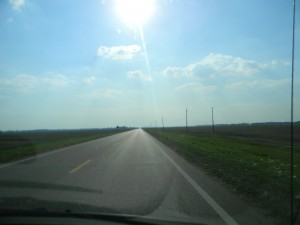 extraordinary, as soon as we turned west on to Highway 278 it felt like we entered a new world. The dense forest that had occupied both sides of the road only minutes before vanished to reveal a wide open view of the Delta plane. Cotton fields stretching to the horizon, cut in two by the road on which we traveled, a seemi
extraordinary, as soon as we turned west on to Highway 278 it felt like we entered a new world. The dense forest that had occupied both sides of the road only minutes before vanished to reveal a wide open view of the Delta plane. Cotton fields stretching to the horizon, cut in two by the road on which we traveled, a seemi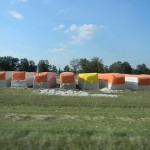 ngly endless road, straight, flat, and disappearing as far into the distance as the eye could see. Aside from other vehicles on the highway, the occasional farmhouse, and farm equipment sparsely scattered throughout the fields, the vastness of this geography was otherworldly. Although this last 40 or so miles was the shortest leg of the drive, our virgin viewing of this fertile Delta plane was empowering and made us feel a bit the wiser, almost as if we were the first explorers to set foot upon a newly discovered continent.
ngly endless road, straight, flat, and disappearing as far into the distance as the eye could see. Aside from other vehicles on the highway, the occasional farmhouse, and farm equipment sparsely scattered throughout the fields, the vastness of this geography was otherworldly. Although this last 40 or so miles was the shortest leg of the drive, our virgin viewing of this fertile Delta plane was empowering and made us feel a bit the wiser, almost as if we were the first explorers to set foot upon a newly discovered continent.
The Shack Up Inn and The Robert Clay Shack
Upon entering Clarksdale, located in Coahoma County, Mississippi, we turned south onto Highway 49 for a couple of miles and found 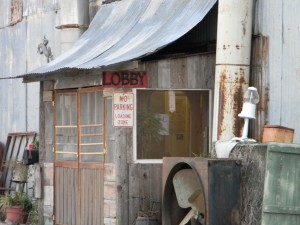 our way to the Hopson Plantation and the location of the place we would be staying, The Shack Up Inn. As we crossed over some railroad tracks, several old ‘barn-like’ buildings covered with rusty corrugated tin came into view, and we passed a row of shacks as we began searching for the lobby. At first glance the main entrance appeared to be a cross between an antique store and a junkyard, and if
our way to the Hopson Plantation and the location of the place we would be staying, The Shack Up Inn. As we crossed over some railroad tracks, several old ‘barn-like’ buildings covered with rusty corrugated tin came into view, and we passed a row of shacks as we began searching for the lobby. At first glance the main entrance appeared to be a cross between an antique store and a junkyard, and if 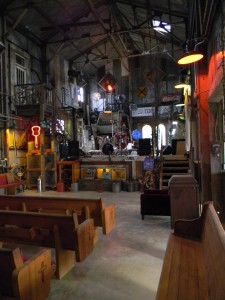 it were not for a small red sign bearing the hand-painted word ‘lobby’, we might have driven right by. We were greeted warmly by Marc, the woman working at the front desk, and she checked us in while giving us a quick overview of the Inn and some other local attractions. The main lobby is housed within an enormous ‘cotton gin’, and on the other side of the lobby walls the large open space has been transformed into a music hall. After checking in we took a few moments to explore this magnificent room which featured a stage at one end, and church pews and other miscellaneous seating at the other. After a few minutes of soaking in some very unique rustic folk art, which seemed to cover every square inch of this huge room, we headed over to our shack to get settled.
it were not for a small red sign bearing the hand-painted word ‘lobby’, we might have driven right by. We were greeted warmly by Marc, the woman working at the front desk, and she checked us in while giving us a quick overview of the Inn and some other local attractions. The main lobby is housed within an enormous ‘cotton gin’, and on the other side of the lobby walls the large open space has been transformed into a music hall. After checking in we took a few moments to explore this magnificent room which featured a stage at one end, and church pews and other miscellaneous seating at the other. After a few minutes of soaking in some very unique rustic folk art, which seemed to cover every square inch of this huge room, we headed over to our shack to get settled.
We fell in love with ‘the Robert Clay shack’ almost as soon as we set foot within. Blues music, courtesy a small TV tuned to Sirus radio’s Bluesville (the only channel available) was playing softly as we took a look around and, like the lobby, this interior was a folk art spectacle as well. As I would later learn from Bill, one of the owners, this is their ‘flagship shack’, and it showed. A bedroom at one end, a small bathroom, and an open concept kitchen that expanded into a living room all felt warm and inviting. An old church pew made for a bench, a slightly out of tune piano in the corner, and a screened in back porch only added to the charm. Much of the furnishings and decor looked like 1950’s 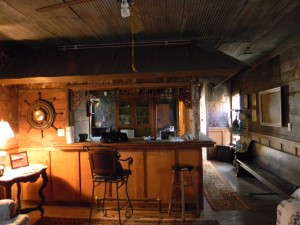 era or earlier, and this is obviously part of the intended experience. Bill would later tell me a little history about this shack.
era or earlier, and this is obviously part of the intended experience. Bill would later tell me a little history about this shack.
In another town in Mississippi, a sharecropper named Robert Clay lived his entire life in this humble abode, raising several sons by himself. When he was an old man, his sons, having moved out many years prior, tried to get him to leave this place and come live with them but he refused. He died an old man in the home in which he lived most of his life, and sometime after his death the shack was moved to it’s current location. After renovating the main body of the shack, the workers, upon exploring the attic to install duct work, discovered a whiskey still, making at least one reason apparent as to why Robert refused to leave. This kind of history just can’t be had at a Holiday Inn or Best Western and only added to the mystique.
One Amazing Sunset
After getting settled in and eating dinner we decided to walk around the grounds for a bit to take in some sites. While exploring the courtyard, the sun began to set on the distant horizon. We stood in wonderment as the sky transformed through a myriad of colors while the sun grew bigger and bigger before disappearing beneath the edge of the earth. In the last few moments before it became invisible beneath the horizon, the sky was on fire and time seemed to stand still. We took a few pictures to preserve the moment, and even though the photos are quite striking, it seems that some magical moments are intended for a single moment in time, coming and going like a breath of wind.
Blues Jam at Ground Zero
A little while later we headed out to the Ground Zero Blues Club, co-owned by Coahoma county resident Morgan Freeman, in downtown Clarksdale to attend the weekly Thursday night blues jam. This week it was being hosted by a local favorite, Big Anthony, and he was already on stage playing some fiery blues with his band when we walked in. Walking into a dark and unfamiliar night club with my guitar slung over my shoulder is something I’ve done many times before, but on this warm summer night in the deep South I must admit I was a little nervous, at least initially. The doorman was friendly enough, as was our waitress, and we gradually began to feel more comfortable after ordering a couple of beers and enjoying some of the show. Big Anthony, backed by a strong rhythm section of bass and drums, was playing some authentic Delta blues, his deep voice full of character, his guitar playing driving and relentless.
They took a break and then got up the first jammer, an older gentleman on vacation with his wife from Canada. After loaning this 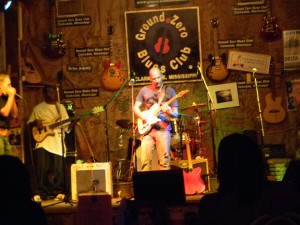 fellow his guitar for a couple of songs Anthony returned to the stage and called me up. Backed by the house drummer and bassist, I ripped through ‘Done Somebody Wrong’, ‘Goin’ Down’, and ‘Rock Me Baby’, and was quite pleased to receive a response that was somewhat over-the-top. Before leaving the stage, I announced that it was Kelly’s birthday and that we had come to Clarksdale to celebrate it, and several people applauded. As I exited the stage I got several compliments from other musicians who were waiting their turns in the wings. A few minutes later I walked over to the bar to get another beer and an older woman said to me “You were really good, but you don’t look like a blues musician.” “Blues musicians come in all shapes and sizes.” was the clarifying response I gave her before returning to my seat.
fellow his guitar for a couple of songs Anthony returned to the stage and called me up. Backed by the house drummer and bassist, I ripped through ‘Done Somebody Wrong’, ‘Goin’ Down’, and ‘Rock Me Baby’, and was quite pleased to receive a response that was somewhat over-the-top. Before leaving the stage, I announced that it was Kelly’s birthday and that we had come to Clarksdale to celebrate it, and several people applauded. As I exited the stage I got several compliments from other musicians who were waiting their turns in the wings. A few minutes later I walked over to the bar to get another beer and an older woman said to me “You were really good, but you don’t look like a blues musician.” “Blues musicians come in all shapes and sizes.” was the clarifying response I gave her before returning to my seat.
By this point we were starting to get kind of tired so we headed back to the shack. Our first day of this three-day trip drawing to a close, we sipped a beer on the back porch reminiscing our experiences. So far, this little town of Clarksdale had been a wonderful host, and we turned in for the night, excited for what Friday might bring.
Last weekend my wife and I embarked on what turned out to be the most exciting vacation we’ve ever taken. Our three days and nights in historic Clarksdale, Mississippi, birthplace of many of America’s greatest blues artists, was as much an education on American history and culture as it was a vacation. In this small, struggling, yet proud town born in one of the darkest periods in American history, we met some of the friendliest and most soulful people you could ever meet. All the locals made us feel welcome and at home, and we also met and became friends with visitors from several other countries, as well as many other parts of the states. The experience was so massive and life enriching that I will not be able to share it in just one article, so I will spread out my writings about this adventure over several.
Several years ago my wife, Kelly, and I watched a fascinating documentary about an old Mississippi juke joint that was still continuing the traditions of ‘old-school’ Delta blues music. At the time, we talked about how great it would be to go to Mississippi and experience this tradition born out of a time and place that gave birth to so much of our favorite music. By the time we got around to exploring that possibility a couple of years later, sadly, we learned that the place had closed down. So, this year, as her birthday approached, I did a little research to see if there were any other juke joint experiences on which we could embark.
I remembered hearing something about Morgan Freeman owning a nightclub in Mississippi and, also aware of his ongoing work to preserve American roots music, this was where my research would begin. A quick Internet search revealed that he is the co-owner of “The Ground Zero Blues Club”, the namesake of this club derived from its location in Clarksdale, Mississippi, a town in which many of America’s greatest blues artists were born. Artists like Muddy Waters, John Lee Hooker, Son House, and many more. At about 300 miles from Nashville, or a 5 hour drive, the trip was easily feasible, so this idea for a birthday vacation/blues exploration became an instant hit.
When we began looking on the Internet for hotels in the Clarksdale area, we stumbled across what sounded like the perfect place to stay. “The Shack-up Inn“, located on the historic Hopson Plantation, is a series of renovated “sharecropper houses and/or tenant houses” and, after reading what must’ve been 50 or 60 glowing reviews on trip advisor, we booked a couple of nights at the shack that seemed to get the most comments, the Robert Clay shack. Among the amenities toted on the Shack Up Inn website are; AC and heat, running water – both hot and cold, indoor bathrooms, and wireless Internet “which tends to work better if you are near the lobby”. While there is a television in each of these units, the sets receive and play only one channel – Sirus radio’s Bluesville. Our particular shack would also be outfitted with a full kitchen, and old piano, and a screened in porch. The Inn also touts themselves not as a bed and breakfast, but as a “B and B” which they will tell you stands for bed and beer, as they don’t serve breakfast. Another uniqueness offered is the option of using a loner acoustic guitar, available by request in the main lobby.
In the midst of all this research we also began learning about the current live music scene of Clarksdale. While the Ground Zero blues club had some decent reviews, further digging revealed that “Reds Blues Club”, right around the corner, offers a real juke joint experience and is “the real deal”, regularly featuring some of the finest local talent. Of course this town built on such a rich history of musical heritage has plenty to see in the daytime as well. The Delta Blues Museum, Cat Head Delta Blues and Folk Art, and the Rock and Blues Museum all came up in numerous reviews as must sees in Clarksdale.
So our plan was to check in to our shack on a Thursday afternoon, attend the weekly blues jam at Ground Zero that night, explore the town on Friday, party at Reds Friday night, and leave Saturday morning for Memphis where we planned to see Graceland in the afternoon, Beale Street at night, and then spend the night at a local hotel before driving back to Nashville on Sunday. Sounds like fun, right? Well as it would turn out, fun would be the understatement of the year, and we wound up changing some of our plans at the last-minute. As you will read later, the only thing we would see in Memphis would be a view of it from our van window as we passed it on our way home.
The other day I was answering a questionaire for author, Wendy Willis’ upcoming book ‘Making It In Nashville‘ when one of the questions created a moment of pause – “What or who did you have to leave in order to chase your Nashville dreams?” The question was harder to answer than you might think and allowed for a great deal of reflection. As this factor is often underestimated if not ignored by those considering relocation to Nashville, I felt it was worthy of a post here.
The old saying “You never know what you have until it’s gone” is so true, and one that me and my family have come to fully understand upon relocating to Nashville. Shortly after I left my native homeland of New England I remember thinking “I’ll still be able to come home and visit once in a while. And of course I can always just call my friends and family on the phone when I miss them.” While initially this sounded like a good plan, the reality is that once you move 1300 miles away from your home, regular visits become impractical. And once those closest to you are no longer a part of your daily routines, some of these relationships can slowly begin to fragment.
Who did I have to leave to chase my Nashville dreams? When I left New England I left behind about 40 guitar students, many of whom I had been teaching for years and had become good friends. My parents and direct family, friends I had grown up with, people I played in bands with, and my wife and son’s family and friends were also rendered to essentially telephone and e-mail correspondence. You never realize how much you’ll miss these people until some time passes. Even though I do still keep in touch with my old friends and family, it’s still tough. In spite of the occasional visit back home, it’s almost as if many of them were part of another life.
What did I leave behind to chase my Nashville dreams? – Comfort, stability, my teaching career, my peers, my career as a nightclub musician, a familiar way of life, almost every relationship that ever meant anything to me, a 10 minute drive to the ocean, and all the familiar landmarks and places I had seen daily for 33 years. I also left behind harsh winters, as many bad habits as I could, and a music scene in which I could not find fulfillment. (In hindsight this lack of ‘fulfillment’ might actually have been more related to how I perceived myself than any fault of the music scene.)
The passage of time does change one’s perspective on life. It’s taken me almost a decade of working in Nashville to realize that I took a lot of things for granted in my earlier life. Nashville is a massive music industry full of opportunities that can’t be found elsewhere. While this is a good thing in some ways, it also creates an atmosphere of extreme competition, and a social atmosphere I often call ‘the land of the permanent job interview’. It wasn’t like that back home, and sometimes I miss that more carefree musical atmosphere. Most people in the Nashville music industry have an agenda and this can make it harder to find ‘real friends’. Sometimes I find myself yearning for the past, where genuine and deep relationships were more obvious.
While adjusting to the absence of all things familiar has been difficult, and I do miss my old life and friends, I am still glad I made this move. The journey has been far and wide, a life-changing experience that has taken me down many unsuspecting roads. Had I not embarked on this journey, I would not be the person I am today.
This past weekend was one of the last outings of the 2010 festival season for Rhett Akins and gang. Like many things in life, outdoor festivals are like a potluck dinner – you never know what’s under the lid of that next casserole dish. That goes for not just the event itself, but to the friend and foe of every outdoor show – the weather. We’ll get to the weather debacle in a minute.
The event we would be playing on this eve was ‘The Old Threshers’ at the Shelbina Fairgrounds, in Shelbina Missouri. For those of you 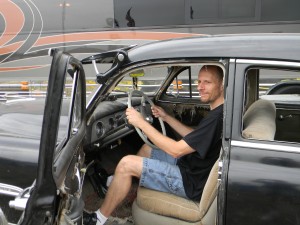 not in the know, an old threshers event is kind of a fair with a tractor theme, and this event sported some rare old beauties right out of yesteryear. After parking our bus and getting situated, we took a walk around the fairgrounds to see the sights. We didn’t get but 5 feet from the bus door when the first spectacle presented itself in the form of a 51 Chevy, the owner of which notified us that this vehicle was ours to use for the day. Who needs a runner when you’ve got a 51 Chevy at your disposal! After a few minutes of checking out and photographing this rarity, we set out on foot, camera in hand.
not in the know, an old threshers event is kind of a fair with a tractor theme, and this event sported some rare old beauties right out of yesteryear. After parking our bus and getting situated, we took a walk around the fairgrounds to see the sights. We didn’t get but 5 feet from the bus door when the first spectacle presented itself in the form of a 51 Chevy, the owner of which notified us that this vehicle was ours to use for the day. Who needs a runner when you’ve got a 51 Chevy at your disposal! After a few minutes of checking out and photographing this rarity, we set out on foot, camera in hand.
Right around the corner we stumbled upon a bluegrass band consisting of a couple of fellows on acoustic guitars, two banjo players, a woman playing a mandolin, they even had a wash tub base. They were pretty 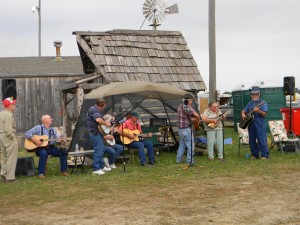 good too, and we stopped to listen for a few. It was then on to the blacksmith shop where we checked out some fine metal crafting by some locals. We dodged a few big tractors on the way over to an old schoolhouse, passing
good too, and we stopped to listen for a few. It was then on to the blacksmith shop where we checked out some fine metal crafting by some locals. We dodged a few big tractors on the way over to an old schoolhouse, passing 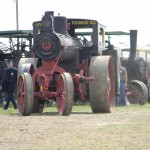 through an Amish village along the way. The old schoolhouse reeked of personality, circa late 1800s/early 1900s. As some kids were writing on the blackboard we took a look around, snapping a few more photos. This part of the day actually felt more like a class field trip than it did a gig. It was now getting to be time for load in, so we returned to the stage area to get to work.
through an Amish village along the way. The old schoolhouse reeked of personality, circa late 1800s/early 1900s. As some kids were writing on the blackboard we took a look around, snapping a few more photos. This part of the day actually felt more like a class field trip than it did a gig. It was now getting to be time for load in, so we returned to the stage area to get to work.
After our gear was loaded onto the deck, we set up and went about our sound check. Once we got it dialed in pretty good we took a few minutes to learn one of Rhett’s most recent songs, ‘Chicks, Trucks, and Beer’, a catchy little ditty with a funky beat he wrote a couple of days prior. It was then off to the hotel for showers, and this was when the weather started to go downhill. The sky grew dark, almost as black as night on the horizon, the wind picked up, and a short while later a massive downpour ensued. People were leaving in droves as we received over an inch of rain in about 45 minutes. Back on the deck, stagehands and local crew scurried to tarp the equipment, but nothing could be done to prevent the rest of this once dusty Fairgrounds from becoming one gigantic mud pit.
After the rain stopped, tractors began scraping down the mud in front of the stage. Underneath the mud was more mud, so they had to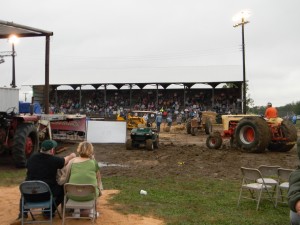 bring out bales of hay and spread straw to create acceptable conditions for the concertgoers. They also ran a series of boards for us to walk on from the stage to the bus (yes, the mud was actually that bad). Despite these obstacles we weren’t going to let a little rain and mud ruin this day, and by 7:15 the opening band ‘Little Dixie’ was taking the stage. Even though the deluge had run off a good portion of the festival attendees, there was still at least 1000 or so that stuck around for our show. At 8:15 we were off and running and about three songs in Rhett played ‘Friends with Tractors’ an obvious crowd pleaser for an
bring out bales of hay and spread straw to create acceptable conditions for the concertgoers. They also ran a series of boards for us to walk on from the stage to the bus (yes, the mud was actually that bad). Despite these obstacles we weren’t going to let a little rain and mud ruin this day, and by 7:15 the opening band ‘Little Dixie’ was taking the stage. Even though the deluge had run off a good portion of the festival attendees, there was still at least 1000 or so that stuck around for our show. At 8:15 we were off and running and about three songs in Rhett played ‘Friends with Tractors’ an obvious crowd pleaser for an 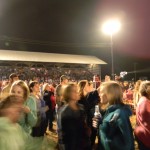 event such as this. The crowd was responsive and singing along, despite a strong prevailing wind that was a bit overbearing at times. About an hour into our show some massive lightning strikes began to appear on the horizon, so we did a couple of more songs to finish our set.
event such as this. The crowd was responsive and singing along, despite a strong prevailing wind that was a bit overbearing at times. About an hour into our show some massive lightning strikes began to appear on the horizon, so we did a couple of more songs to finish our set.
Our show complete, we tore down our gear and found our way over to the ‘Bluegrass Barn’ where the afternoon band was engaged in a little ‘pickin’ and grinnin’ after party. Rhett even sat in for a couple, leading the band through the Hank Williams classic ‘Honky-Tonkin’ and a couple of other rarities. The spirits were high, and everyone from this nice community made us feel right at home. A little while later, Steve made a mad dash with the bus across the muddy field, tires spinning every inch of the way. When we finally made it to the street, he made a big sigh of relief, perhaps having flashbacks of having to be towed out of a mud bog in Alabama earlier in the summer. Even if we had got stuck I wouldn’t have been too worried, at this show we definitely had ‘friends with tractors”. A few minutes later, and we were rolling down the highway. Thanks for making it a great event Shelbina!
Anyone who has ever gigged in Nashville knows that it is hard to make any real money by playing in the clubs around town. Aside from a very small handful of gigs that might pay $75-$100 per player, most offer minimal to no pay – some offering a base pay $20 to $30 plus tips, a lot more offer tips only (which often means essentially playing for free), and a few are even pay to play. Even on the base pay plus tips gigs quite often a player will only take home $25 or $30.
So from time to time the “playing for free” debate rears up in conversations. Some say that performing music in public for free is the only way they can gain experience, obtain exposure, make connections, and have any sort of musical life beyond practicing in the basement. Others claim that playing for free makes it harder to receive fair (or any) compensation for their services. Why would clubs and venues pay for bands and players if most will do it for free?
While both are legitimate arguments, to understand why things are the way they are I think it is important to consider the overall role of music and musical performers throughout history, not just in today’s world.
Daniel Levitin, in his book “This Is Your Brain on Music” talks about music being at the heart of human evolution.
“No known human culture now or anytime in the recorded past lacked music. Some of the oldest physical artifacts found in human and protohuman excavation sites are musical instruments.”
He continues
Even more so in non-industrialized cultures than in modern Western societies, music is and was a part of the fabric of everyday life. Only relatively recently in our own culture, 500 years or so ago, did a distinction arise that cut society in two, forming separate classes of music performers and music listeners. Throughout most of the world and for most of human history, music making was as natural an activity as breathing and walking, and everyone participated. Concert halls, dedicated to the performance of music, arose only in the last several centuries.
With that, I state my case that music has always been there and is an important and crucial part of our being. It is perhaps the earliest form of communication. Somewhere along the way this art form, this way of life, morphed into a product, or a commodity.
In the book “Muse Power: How Recreational Musicmaking Heals Depression and Other Symptoms of Modern Culture” by Cheri D. Lunn writes:
Prior to the 20th century, the concept of selling music wasn’t really commonplace. One of the very first to consider music as a marketable commodity, was Wolfgang Amadeus Mozart. “In the mid-to-late 1700s, performers and composers such as Wolfgang Amadeus Mozart began to seek commercial opportunities to market their music and performances to the general public.” (5 Wikipedia /Dear Constanze The Guardian) Before that, in more traditional cultures, the Griots, bards, and musicians were cared for by their communities, as equals in the tribe doing their part to contribute. In Europe, up until the 1700’s music was supported by patronage from the aristocracy, or the church, and so there was no need for artists to sell themselves; and so the concept of selling music had just not yet come to be.
A crucial change in the history of folk music began during the twentieth century with folk artists adopting the very western concept of “marketing for money,” or “selling” the music of the people. In this time, a new genre of popular music arose that basically became an imitation to the original traditions of folk music as it was sung by ordinary people. These “folk” artists marketed themselves alongside more popular and modern emerging artists and created a niche for themselves by performing traditional music and songs in amplified concerts, and disseminating their work by recordings and broadcasting.
But along with the commercialization of music and musical performers, especially now in the digital age, comes somewhat of a desensitization to music, or what I call a ‘dumbing down’ of the masses in this regard. In today’s world, music is heard everywhere – from traditional advertising like TV and radio commercials to ring tones and ring backs, from video games to iPods, today’s Internet generation is saturated with digital music overload. In many situations, recorded music is now free, and with the advent of software like garage band, millions can now make homemade recordings to further flood the airwaves. In the midst of this oversaturation, TV shows like “American Idol”, “Nashville Star”, and “America’s Got Talent” have perpetuated the false reality that the masses can also now obtain superstardom.
Put all this together, and you’ve got more people than ever trying to get into the “music business”. But as millions more each year try to enter this world, the opportunities for them will inevitably shrink. There are only so many bars and nightclubs that need live music.
If you consider this history, it is fair to say that the concept of being paid for your music, or paid to play your music, is relatively new and largely an invention of our modern capitalistic society. Don’t get me wrong, I’m not suggesting we abandon this concept, this is how I am currently earning the bulk of my living. What I am suggesting is that the evolution of the paid musical performer may have been accidental, and is not necessarily a sustainable vocation in this modern world.
Music belongs to everybody. We need to better understand the role that music has played in our history, and how the cultivation of music as a part of our culture can benefit our world as well as the futures of our children. Does our future hold a world in which musical performers are paid for their ‘services’, or will the performance of music one day return to something that is shared by everybody? Did society really benefit when music was turned into a product? Do we deserve to be “paid to play”? I don’t know if I’ll always be able to earn a living from music, but even if one day I can’t, I’ll always play music, doing so enriches my life.
What is music, and the art of performing it worth to you?
Last week I posted a blog in which I asked you (the reader) what questions you would ask somebody from a record label if you had access. That blog prompted some pretty interesting questions, and when I conducted my interview today with EJ Bernas, Senior Director of Southwest region of Universal Music Group, those questions made up the bulk of what I asked him. The interview was lengthy and informative, and a lot of work lies ahead (transcribing, editing, proofing, etc.) before this fascinating conversation will be print ready. So for now, I would just like 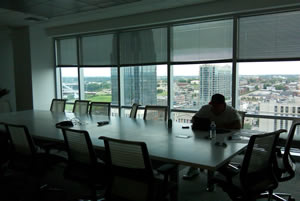 to share a few high points of this unique experience.
to share a few high points of this unique experience.
I arrived in downtown Nashville just before 1 PM and found a parking spot in front of the Bridgestone arena. After feeding some quarters into the meter (three dollars only got me two hours) I walked a couple of blocks over to the UMG headquarters, located on Commerce street. After taking the elevator to one of the top floors of an otherwise unsuspecting office building, I emerged into the lobby and found my way to the receptionist. The friendly young lady informed EJ that I had arrived, and a moment later he came out to meet me. We retreated into a large comfortable conference room which had a spectacular view of downtown Nashville.
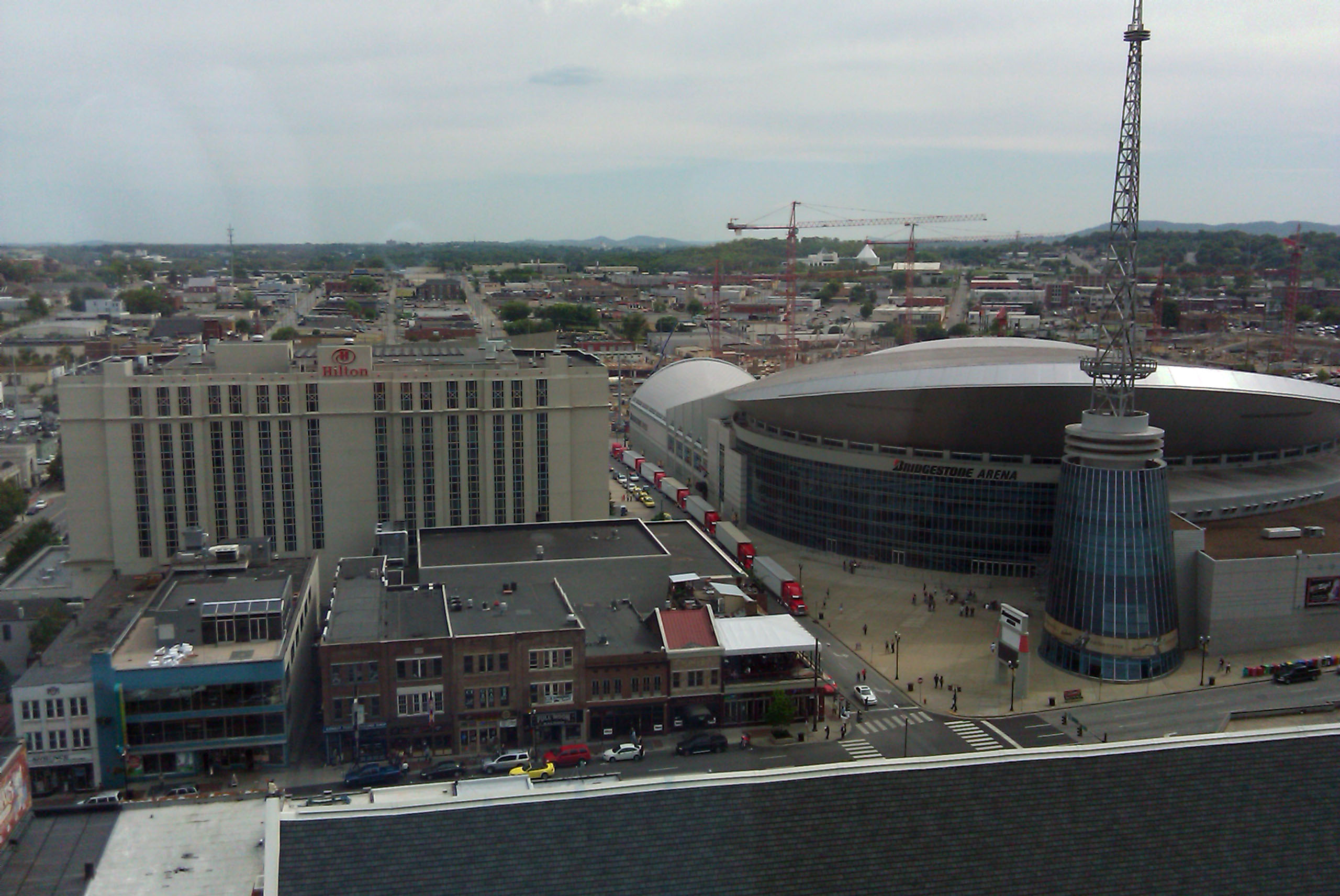 I could write an entire article just about what I saw in those few short seconds gazing out that window. The roof of the Ryman Auditorium just below us, the hustle and bustle of people milling about on Broadway, the Bridgestone arena, the controversial new skyscraper still being constructed, the Cumberland River in the distance – a city truly alive in so many ways. Behind every window of the hundreds of buildings visible from this spot was a story. For every car that passed by on the streets below, another story. Some say that this is a city built on dreams, and from this vantage point I could literally feel that kind of intangible element that fuels such a mysterious place.
I could write an entire article just about what I saw in those few short seconds gazing out that window. The roof of the Ryman Auditorium just below us, the hustle and bustle of people milling about on Broadway, the Bridgestone arena, the controversial new skyscraper still being constructed, the Cumberland River in the distance – a city truly alive in so many ways. Behind every window of the hundreds of buildings visible from this spot was a story. For every car that passed by on the streets below, another story. Some say that this is a city built on dreams, and from this vantage point I could literally feel that kind of intangible element that fuels such a mysterious place.
“This is an amazing view. Do you have a view this cool from your office too?” I asked. “You bet, my office is right next door. You can see the roof of the old church (Ryman) below” he said as we both gazed across the vast expanse. With that, we each took a comfortable spot at the table and dug into an hour and a half discussion about the state of the recording industry, radio, and how today’s aspiring artists fits into that world (at times the discussion became more like how the recording industry and radio fit into the world of the aspiring artist.) Like I said, 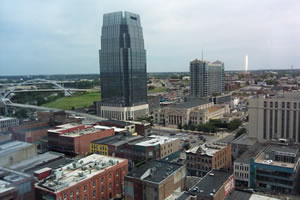 the contents of this interview still need to be transcribed and reviewed before I can share any of it, so for now you’ll have to just settle for me simply bragging about this day.
the contents of this interview still need to be transcribed and reviewed before I can share any of it, so for now you’ll have to just settle for me simply bragging about this day.
At one point during the interview, EJ’s boss walked through the room and I received a brief introduction. A little while later another man walked through, and I was again introduced, this time to the head of A&R. EJ explained to me that UMG (Universal Music Group) consists of MCA, Mercury, and Lost Highway Records and represents artists like Billy Currington, Julianne Hough, Reba McEntire, Randy Rogers Band, George Strait, Sugarland, Jamey Johnson, Josh Turner and Shania Twain, among others. Even though I’m not aspiring for any sort of success as a radio star, it did occur to me just how fortunate I am to know someone like EJ – a warm and open individual gracious enough to give this glimpse into a world in which so many aspire, yet so few ever travel.
After the interview was over, he walked me back out to the lobby where I had the receptionist snap a quick picture of the two of us. I thanked him again and made my way back to my car. It was definitely a learning experience for me and I know this interview will add much valuable perspective to all the aspiring artists and musicians who will eventually read it. Thanks again EJ for making my day, and my book.
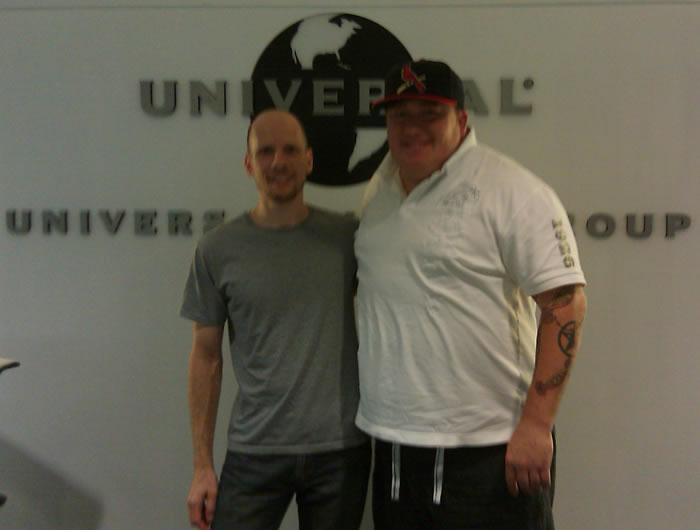
Saturday night’s show at the U.S. Bank Balloons, Tunes and BBQ Festival in Bowling Green Kentucky turned out to be a huge success, but earlier in the day things were looking pretty bleak. All week long the weather forecast showed a strong possibility of severe weather for this area, as the remnants of Tropical Storm Hermine were projected to move through. When we arrived on site at the Warren County Regional Airport a strong steady wind was already blowing, despite an otherwise beautiful sunny day.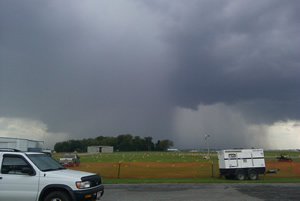
Right around the time we were about to start micing up our instruments for soundcheck, the sky grew ominously dark, and a few minutes later a strong gust of wind knocked over a large column of PA speakers. Fortunately, nobody got hurt, but it was a frightful moment. As a downpour was imminent, we quickly scrambled to put tarps over our stage gear. Minutes later we watched from the bus window as a strong steady rain pummeled the airport grounds. Just when we thought our day was completely doomed the rain subsided, and a short while later the sun returned to dry out the rain soaked grounds.
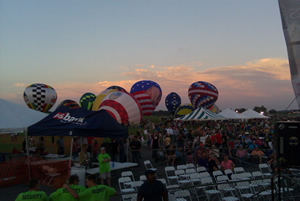 As it turns out, we got real lucky and it never did rain again. The first two days of the festival had been a complete washout due to the weather, but by late afternoon the winds had died down, and some hot air balloons began to permeate the sky for the first time on this weekend. By the time the first group, Easy Street, went on stage at 5:30 there was already a couple of thousand people in front of the large mobile stage, and their set was well received. A little while later, after the second band, Floord, was finished with their set, Nick Hoffman (Kenny Chesney’s fiddle player) took the stage with his band. During Nick’ set I organized and led a large meet and greet backstage with some radio station contest winners who were more than excited to meet Rhett.
As it turns out, we got real lucky and it never did rain again. The first two days of the festival had been a complete washout due to the weather, but by late afternoon the winds had died down, and some hot air balloons began to permeate the sky for the first time on this weekend. By the time the first group, Easy Street, went on stage at 5:30 there was already a couple of thousand people in front of the large mobile stage, and their set was well received. A little while later, after the second band, Floord, was finished with their set, Nick Hoffman (Kenny Chesney’s fiddle player) took the stage with his band. During Nick’ set I organized and led a large meet and greet backstage with some radio station contest winners who were more than excited to meet Rhett.
At about 8:45 it was finally our turn for some stage time, the crowd had now swelled to around 10,000, and was at the peak of this annual 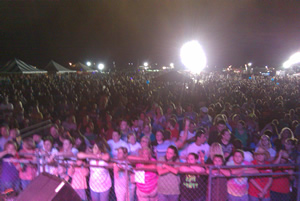 event’s outing. We dug in hard for a rockin’ 90 minute show, the crowd into it from the onset. About halfway through our show, Rhett brought up his son, Thomas Rhett to sing the soon-to-be classic ‘Duck Blind’. After this well received rendition, a woman somewhere near the front row yelled out “He’s real sexy too!” This helped prompt Rhett to prod young Thomas into doing one more song, ‘Tobacco’, one of Thomas’s original compositions which he performed solo acoustic. Apparently, Thomas takes after his dad, who bragged about his son’s first cut as a songwriter on Jason Aldeans’ latest album, and the fact that “Some day soon you’re going to be hearing Thomas Rhett on the radio too!” After Thomas left the stage to a roaring applause, we continued on with our set, and a little while later Rhett invited up Nick Hoffman to sit in for a couple of tunes on the fiddle. Rhett ended the show by playing a solo acoustic version of “Gimme That Girl” the blockbuster hit he wrote for Joe Nichols. This soft and soulful piece helped to wind down the electricity in the crowd, and upon its conclusion they began to slowly exit the concert grounds.
event’s outing. We dug in hard for a rockin’ 90 minute show, the crowd into it from the onset. About halfway through our show, Rhett brought up his son, Thomas Rhett to sing the soon-to-be classic ‘Duck Blind’. After this well received rendition, a woman somewhere near the front row yelled out “He’s real sexy too!” This helped prompt Rhett to prod young Thomas into doing one more song, ‘Tobacco’, one of Thomas’s original compositions which he performed solo acoustic. Apparently, Thomas takes after his dad, who bragged about his son’s first cut as a songwriter on Jason Aldeans’ latest album, and the fact that “Some day soon you’re going to be hearing Thomas Rhett on the radio too!” After Thomas left the stage to a roaring applause, we continued on with our set, and a little while later Rhett invited up Nick Hoffman to sit in for a couple of tunes on the fiddle. Rhett ended the show by playing a solo acoustic version of “Gimme That Girl” the blockbuster hit he wrote for Joe Nichols. This soft and soulful piece helped to wind down the electricity in the crowd, and upon its conclusion they began to slowly exit the concert grounds.
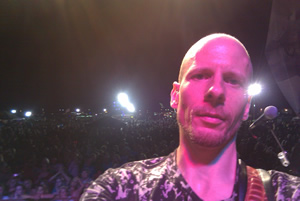 It was a long day, but a good day, and we were all thrilled that the weather wound up being on our side. While this isn’t always the case with these kinds of outdoor shows, past experience has taught me to always hope for the best, while preparing for the worst. We’ve got two more outdoor shows on the books in the upcoming weeks. Hopefully, we’ll get lucky on those too!
It was a long day, but a good day, and we were all thrilled that the weather wound up being on our side. While this isn’t always the case with these kinds of outdoor shows, past experience has taught me to always hope for the best, while preparing for the worst. We’ve got two more outdoor shows on the books in the upcoming weeks. Hopefully, we’ll get lucky on those too!
